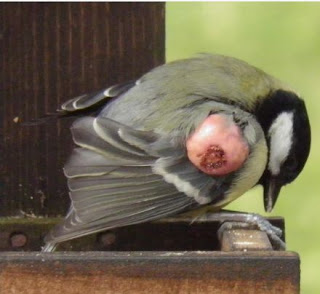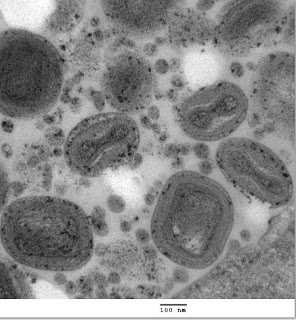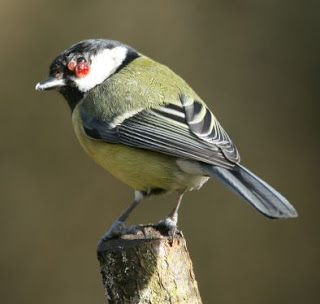

| Visitors Now: | |
| Total Visits: | |
| Total Stories: |

| Story Views | |
| Now: | |
| Last Hour: | |
| Last 24 Hours: | |
| Total: | |
New Strain Of Bird Virus Sweeps Across Britain
Avian pox has been recorded in British bird species such as house sparrows and wood pigeons for a number of years. However, the emergence of a new strain of this viral disease in great tits is causing concern amongst vets and ornithologists.
Wildlife vet Dr Becki Lawson from ZSL says: “Infection leads to warty, tumour-like growths on different parts of a bird’s body, particularly on the head around the eyes and beak.
“Although the disease can be relatively mild in some species, great tits suffer severe growths that can prevent them from feeding and increase their susceptibility to predation,” Dr Lawson added.
Credit: Zoological Society London
Whilst a range of tit species are susceptible to this novel form of the disease, detailed monitoring of birds in Wytham Woods by scientists at the University of Oxford show that great tits are by far the most susceptible.
“Although recovery from infection can occur, our results show that this new strain of avian poxvirus significantly reduces the survival of wild great tits and has particularly large effects on the survival of juvenile birds,” says Dr Shelly Lachish of the Edward Grey Institute at Oxford University
“Based on the numbers of affected great tits that we have observed at Wytham Woods, our models do not predict that this new disease will cause an overall population decline of the species. However, pox-affected populations have lower yearly growth rates. Hence, they are likely to have greater difficulty in recovering from other environmental factors that might reduce their numbers,” Dr Lachish added.
With help from the public, scientists at the RSPB and ZSL have tracked the disease, which has spread rapidly in five years from south-east England to central England and into Wales. The annual seasonal peak of observed cases occurs in the early autumn months and incidents continue to be reported at this time of year.
Genetic studies on the virus show that it appears to be the same strain seen previously in Scandinavia and more recently in central Europe, and is unlikely to have originated within Great Britain. BTO data on bird movements confirms that great tits rarely migrate outside the country. The spread of the virus to Britain is, therefore, thought to have occurred through the arrival of an infected vector, such as a mosquito.
Funding from NERC (the Natural Environment Research Council) enabled the detailed research reported here, and scientists are continuing to work together to monitor impacts of this new avian poxvirus strain on the population of great tits in the UK. They are calling on the public to assist in these efforts by reporting any signs of disease in garden birds to the RSPB, and have also highlighted that avian pox is not known to be infectious to humans or other mammals.
2012-11-22 05:01:04
Source: http://nanopatentsandinnovations.blogspot.com/2012/11/new-strain-of-bird-virus-sweeps-across.html
Source:





